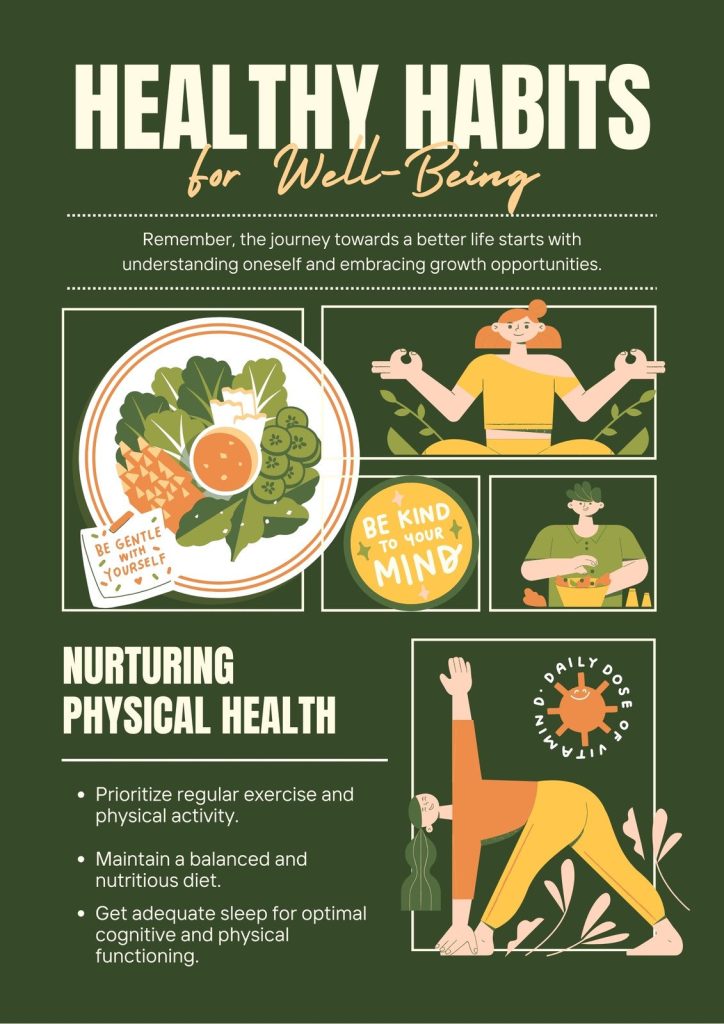Balanced Nutritive Diet Tips for a Healthier Lifestyle

In today’s fast-paced world, achieving a balanced nutritive diet can often feel daunting. However, understanding the essentials can transform your lifestyle into a healthier one. By making conscious choices about what we eat, we enhance our physical wellbeing and improve our mental clarity, aiding in productivity and emotional health.
Why Focus on a Balanced Diet?
A well-rounded diet serves as the foundation for better health. It provides the body with necessary nutrients to thrive, supporting:
- Optimal energy levels: A variety of nutrients fuels your body, allowing you to stay active throughout the day. For instance, complex carbohydrates from sources like oats and sweet potatoes offer sustained energy compared to refined sugars that cause energy spikes and crashes.
- Weight management: Consuming a balanced diet rich in whole foods can help regulate appetite and maintain a healthy weight. Foods high in fiber, such as fruits, vegetables, and whole grains, not only satisfy hunger but also help control cravings.
- Boosted immunity: Nutrients from a diverse diet strengthen the immune system. Foods rich in antioxidants, such as berries and greens, contribute to overall health and can help ward off illnesses. Vitamins C and D, along with zinc from nuts and seeds, are crucial players in immune function.
Core Components of a Nutritive Diet
Embracing a balanced diet involves including various food groups in our meals. Consider incorporating:
- Fruits and vegetables: Aim for at least five servings a day. Incorporate colorful options like blueberries, leafy greens, and bell peppers for a wide range of vitamins and minerals that support overall health.
- Whole grains: Choose options like quinoa, brown rice, and whole-grain bread. These grains are higher in nutrients and fiber compared to their refined counterparts, promoting digestive health and keeping you full longer.
- Protein sources: Incorporate lean meats, legumes, and nuts into your meals. Protein is essential for muscle repair and growth, while plant-based proteins like beans and lentils can offer health benefits without the saturated fats found in some animal products.
- Dairy or alternatives: Opt for low-fat or plant-based options to meet your calcium needs. Products such as almond milk or Greek yogurt provide nutritional benefits without excessive calories.
Making Simple Changes
Transitioning to a healthier diet doesn’t have to be overwhelming. Starting with small, manageable changes can lead to lasting habits. Take a moment to evaluate your current eating habits and identify areas for improvement. Consider meal prepping to make healthy choices more convenient, or try swapping out a sugary snack for a piece of fruit. These minor adjustments can significantly impact your overall health.
Additionally, being mindful of portion sizes and eating dedicated meals without distractions can transform your relationship with food. Engage with resources like nutrition workshops or mobile apps that help track food intake and educate you on making healthier choices.


In essence, understanding the importance of a balanced nutritive diet can pave the way for a healthier lifestyle, making it easier to thrive in our busy lives.
CHECK OUT: Click here to explore more
Understanding the Importance of a Balanced Nutritional Intake
A balanced nutritive diet is not merely a fashion statement propagated by health gurus; it is a scientifically-backed approach to preserving your well-being. In a society where fast food and convenience often overshadow nutritional value, understanding the significance of balance in what you consume is crucial. Research indicates that a diverse diet lowers the risk of chronic diseases, including heart disease, diabetes, and certain types of cancer. Furthermore, it enhances overall vitality and aids in mental wellness.
The Power of Macros
Successful navigation of a balanced diet involves recognizing the three macronutrients that define our dietary foundation: carbohydrates, proteins, and fats. Each plays a vital role in our body’s functions:
- Carbohydrates: Often misunderstood, carbohydrates are the body’s primary energy source. However, it is essential to choose the right types: favor complex carbs over simple sugars. Complex options like whole grain pastas, oats, and legumes provide sustained energy along with fiber that supports digestive health.
- Proteins: This macronutrient is the building block for muscles, tissues, and essential enzymes. Not every protein source is created equal. Aim to incorporate a combination of both animal-based proteins, like lean chicken or fish, and plant-based proteins, such as lentils and chickpeas, to obtain a complete amino acid profile necessary for optimal body function.
- Fats: Healthy fats are essential for brain health and hormone regulation. Incorporate sources of unsaturated fats like avocados, nuts, and olive oil while being mindful to limit saturated and trans fats found in processed foods, which can lead to health complications.
Micronutrients Matter
While macronutrients receive much attention, micronutrients—vitamins and minerals—are equally important in a balanced diet. These nutrients support immune function, energy production, and cell repair. For instance, Vitamin A, found in carrots and sweet potatoes, supports vision and immunity, while Vitamin E, abundant in nuts and spinach, acts as a powerful antioxidant. Furthermore, minerals like calcium and iron, found in dairy products and leafy greens respectively, are crucial for bone health and oxygen transport in the blood.
Hydration: The Unsung Hero
While maintaining a balanced diet, we must not overlook the role of hydration. Water is vital for nearly every bodily function, from digestion to temperature regulation. Aim for at least eight 8-ounce glasses of water daily, and consider factors like exercise and climate that may increase your needs. Not only does water promote better digestion and nutrient absorption, but it also aids in keeping your skin healthy and vibrant.
In summary, understanding the core elements of a balanced nutritive diet is pivotal for improving and maintaining a healthier lifestyle. By focusing on incorporating a variety of macronutrients and micronutrients into your meals and ensuring proper hydration, you set the stage for longevity and vitality.
| Advantage | Description |
|---|---|
| Nutrient-Dense Meals | A balanced nutritive diet emphasizes meals that are rich in vitamins, minerals, and antioxidants, which can enhance overall health. |
| Weight Management | Incorporating high-fiber foods and healthy fats can promote satisfaction and fullness, making it easier to manage body weight effectively. |
| Improved Mood | A balanced diet is linked to better mental health, with nutrients that support brain function and reduce the risk of mood disorders. |
| Stronger Immunity | Consuming a variety of nutrient-rich foods can enhance your body’s immune response, helping to ward off illnesses. |
Adopting a balanced nutritive diet is not merely about choosing healthy foods; it’s about creating a lifestyle that fosters long-term well-being and vitality. By understanding these key benefits, readers can make informed decisions and explore further to enhance their dietary habits. This approach guides individuals towards not only achieving a healthier lifestyle, but also promoting a sustainable relationship with food. Consider each element of the diet carefully, and remember that even small changes can lead to significant improvements in health outcomes.
SEE ALSO: Click here to read another article
Portion Control: The Balance between Indulgence and Restraint
Understanding what we eat is only part of the equation; the amount we consume is equally crucial in maintaining a balanced diet. Even the healthiest foods can contribute to weight gain when eaten in excess. Portion control is about being mindful of serving sizes, whether you’re dining out or eating at home. The USDA recommends using the “my plate” method: fill half your plate with fruits and vegetables, one-quarter with lean protein, and one-quarter with whole grains. This simple visualization can help maintain balanced portions and prevent overeating.
Mindful Eating: A Delicious Approach to Nutrition
In today’s fast-paced world, many people eat mindlessly, often while multitasking. Mindful eating involves paying full attention to the experience of eating and drinking. It is about savoring each bite, appreciating flavors and textures, and recognizing the body’s hunger and fullness cues. By slowing down and being present during meals, studies have shown that individuals make healthier food choices and are more likely to stop eating when satisfied rather than stuffed. Techniques such as eliminating distractions, eating without haste, and concentrating on chewing thoroughly can foster a more enjoyable and healthful eating experience.
The Role of Meal Planning
One practical step towards a balanced diet is meal planning. Planning your meals in advance allows you to carefully select ingredients that align with your nutritional goals while ensuring that you include a variety of foods in your diet. Consider dedicating a day each week to prepare wholesome meals that can be easily reheated. Not only can this practice save time during busy weekdays, but it also minimizes the temptation to resort to less nutritious convenience foods. Furthermore, it provides an opportunity to explore new recipes and incorporate seasonal produce, keeping your meals fresh and exciting.
Experimenting with Food Variety
A common pitfall in dietary habits is the inclination to consume the same foods repeatedly. Diversity in your diet is not only beneficial for nutritional adequacy; it also keeps meals interesting. Aim to incorporate a spectrum of colors on your plate, as different colored foods often signify various nutrients. For example, incorporate orange sweet potatoes for beta-carotene, green leafy vegetables for iron, and red bell peppers for Vitamin C. Try to explore new grains, legumes, and seasonal fruits, and don’t hesitate to experiment with spices and herbs. This not only enhances flavors but also expands the array of health benefits.
The Influence of Lifestyle on Nutrition
Lastly, remember that a balanced nutritious diet does not exist in isolation from your overall lifestyle. Factors such as sleep quality, physical activity, and stress levels can significantly influence your dietary choices. For instance, chronic stress might lead some individuals to indulge in comfort foods, often high in sugars and fats. Thus, adopting a holistic approach towards health—prioritizing physical activity, establishing a consistent sleep schedule, and practicing stress-relief techniques like yoga or meditation—can create a synergistic effect, amplifying the benefits of a balanced diet.
CHECK OUT: Click here to explore more
Conclusion: Embrace a Healthier Lifestyle Through Balance
In conclusion, adopting a balanced nutritive diet is a vital component of achieving and maintaining a healthier lifestyle. By implementing strategies such as portion control, mindful eating, meal planning, and diversifying your food choices, you can create a sustainable eating pattern that not only nourishes your body but also delights your palate. The integration of various food groups ensures that you are receiving a wide array of nutrients, which is essential for optimal health.
It’s crucial to recognize that nutrition is intertwined with other aspects of life. Enhancing your diet while prioritizing physical activity, ensuring adequate sleep, and effectively managing stress will collectively contribute to higher energy levels and improved well-being. As you embark on this journey towards a healthier lifestyle, remember that small, gradual changes can lead to significant long-term results.
No matter where you start, every step taken towards understanding nutrition and its impact on your health is a step in the right direction. So, explore local farmers’ markets for fresh produce, experiment with new recipes, and educate yourself about the nutrients your body craves. Rethinking how you view food can lead to a healthier relationship with your meals, ultimately enriching your life in more ways than one. For a future filled with vitality and wellness, begin today by embracing the power of balanced nutrition.


